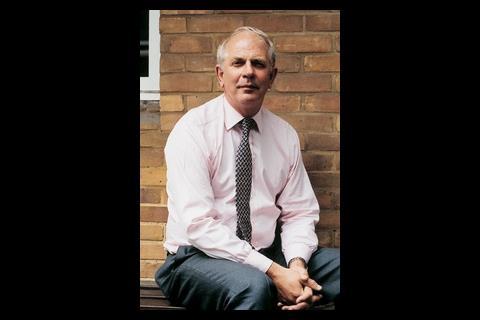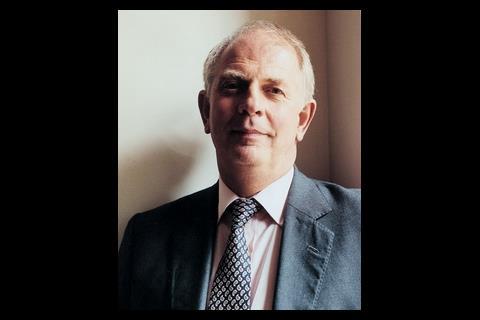Andy Pearson meets CIBSEŌĆÖs new chief executive ŌĆō a former brigadier who is keen for CIBSE to take the initiative in tackling climate change and espouses an inclusive approach
ŌĆ£Welcome. Stephen Matthews. Hello,ŌĆØ barks CIBSEŌĆÖs new chief executive while crushing my hand and vigorously pumping my arm up and down in a warm greeting. After more than 30 years in the army, CIBSEŌĆÖs new chief executive retains much of his BrigadierŌĆÖs manner.
Three weeks into the role, he is already starting to bring his verve, experience and, if first impressions are anything to go by, enthusiasm to bear on his new role. ŌĆ£In many ways, CIBSE is much like the armyŌĆØ he says, referring to the fact that his role in the Institution is relatively well defined. And for Matthews, the similarities do not stop there, as he characterises his chief executiveŌĆÖs responsibilities using another military analogy: ŌĆ£In the army you sign your allegiance to the Crown; here IŌĆÖve signed my allegiance to the members,ŌĆØ he explains.
Enthusiastic about the opportunities presented by his new job, he describes his role as being ŌĆ£part of a team,ŌĆØ and his intention as being to ŌĆ£make a differenceŌĆØ. To his credit, he gives the impression that if he didnŌĆÖt think he could add something to CIBSE, he wouldnŌĆÖt have taken the job. His current aim is to gain a comprehensive understanding of the organisation. ŌĆ£I see my role here in the longer term; I anticipate at least a five-year journey, so I want to be certain that I get it reasonably right,ŌĆØ he explains.
It is obvious Matthews thinks now is an important time for the Institution. ŌĆ£I think there is a fantastic opportunity for an organisation to stand up and say ŌĆśthis is our view of the future and this is what we believe the path is going to be.ŌĆÖŌĆØ He says there are no end of people that want to talk to CIBSE ŌĆō ŌĆ£but how many fit with our plan?ŌĆØ he asks, rhetorically. ŌĆ£We have to generate our own plan; metaphorically, we have to decide what music to play and then dance to it, rather than other people playing the music and us dancing to that. ItŌĆÖs about taking the initiativeŌĆØ.
Sitting at a bare meeting table in his spartan office at the Balham HQ, the 53-year old mechanical engineer does not appear fazed by the challenges ahead. He comes across as friendly and relaxed and, as a result of his time in the army, somebody who is capable of dealing with people ŌĆō a key skill if he is to realise his objectives for the Institution.
Matthews confesses he was unaware that the building services industry existed before this job came to his attention. His experience of professional institutions had been limited to his 30-year membership of the Institute of Mechanical Engineers ŌĆō and he candidly admits that the ŌĆ£blandŌĆØ job specification for the CIBSE post did little to change his perception of institutions as organisations concerned with maintaining the status quo.
What did ŌĆ£turn his lights on,ŌĆØ he says, was a letter attached to the job description from the then president, Donald Leeper. This outlined the InstitutionŌĆÖs role, the importance of greenhouse gases and carbon emissions and what CIBSE was going to do to take the climate debate forward in an informed way. ŌĆ£That made a difference to me,ŌĆØ he admits.
Matthews explains that his interest in climate change can be traced back to his time in the Falklands following the 1982 invasion. ŌĆ£I arrived as an army engineer after the war to repair equipment, helping return the Islands to normality. Behind our HQ, there was a hut with huge aerials and all sorts of scientific equipment run by the British Antarctic Survey to measure ozone depletion. What struck me was that we had this enormous political, military and financial expenditure for restoring freedom to the Falkland Islands ŌĆō and yet arguably the biggest threat was being tackled by six men in a Portakabin that nobody was interested in.ŌĆØ The experience had a big impact on him.
CIBSE has to decide what music to play and dance to it, rather than dancing to other peopleŌĆÖs music
Background briefing
It is clear from the way he keeps returning to the subject throughout our conversation that he enjoyed his career in the army. His military involvement started at the age of 13, when be became an army cadet. After finishing school, he enrolled at Sandhurst and later served in Cyprus, Canada and Germany before returning to the UK to complete a degree at the Royal Military College of Science at Shrivenham. ŌĆ£From there on, my military career took off,ŌĆØ he recalls. By the age of 45 he was a Brigadier, responsible for technical training. ŌĆ£I was at the forefront of my profession and I absolutely loved it.ŌĆØ
After three-and-a-half years, Matthews was asked to organise a study that would put in place what he describes as ŌĆ£the higher management of army trainingŌĆØ and relocated to the armyŌĆÖs London HQ for seven months.
He gives the impression that his dealings with the spin and froth of politicians, civil servants and some of the army top brass while in London were at odds with his military experience and, when Raytheon Systems approached him with ŌĆ£an offer I felt I could not refuseŌĆØ, he left the army. At the time, the American company was bidding to provide military training under a public private partnership arrangement. Matthews worked for Raytheon for 11 months until it suddenly withdrew from PFI work, making him redundant.
The following month, he was running Smiths Security services ŌĆō then owned by John Madejski, the maverick businessman and chairman of Reading Football Club ŌĆō a flagging business that had not turned in a profit for the past 12 years. It took him 18 months to turn the company round and get it to break even. He says it was the hardest he had ever worked in his life, both physically and mentally. However, it was becoming obvious the firm was marginal to its ownerŌĆÖs business and Matthews, unhappy about being confined to the sidelines, left.
Unperturbed, he set up his own management consultancy business, where he had ŌĆ£a number of well known clients.ŌĆØ But two months in, he began to realise he worked best as part of a team. He said he also started to question what difference management consulting was making to life. It was at this point that he decided to join CIBSE.
So what does he hope to achieve in his time at Balham? His response is immediate and earnest: ŌĆ£Success for me would be for the membership to be saying: ŌĆśthis is a fantastic organisation.ŌĆÖŌĆØ
Matthews has a refreshingly open and inclusive approach to his new role: ŌĆ£I hope the members will feel able to come and talk to me, write to me or ring me up,ŌĆØ he says. He admits that his duties mean that his response will not always be immediate and it might not always be what they want to hear. ŌĆ£I donŌĆÖt think you can do it in a half-hearted way, he explains. ŌĆ£If members are passing Delta House, my door will always be openŌĆØ he says. Just be prepared to have your hand crushed.
Source
ąŪ┐š┤½├Į Sustainable Design



















No comments yet